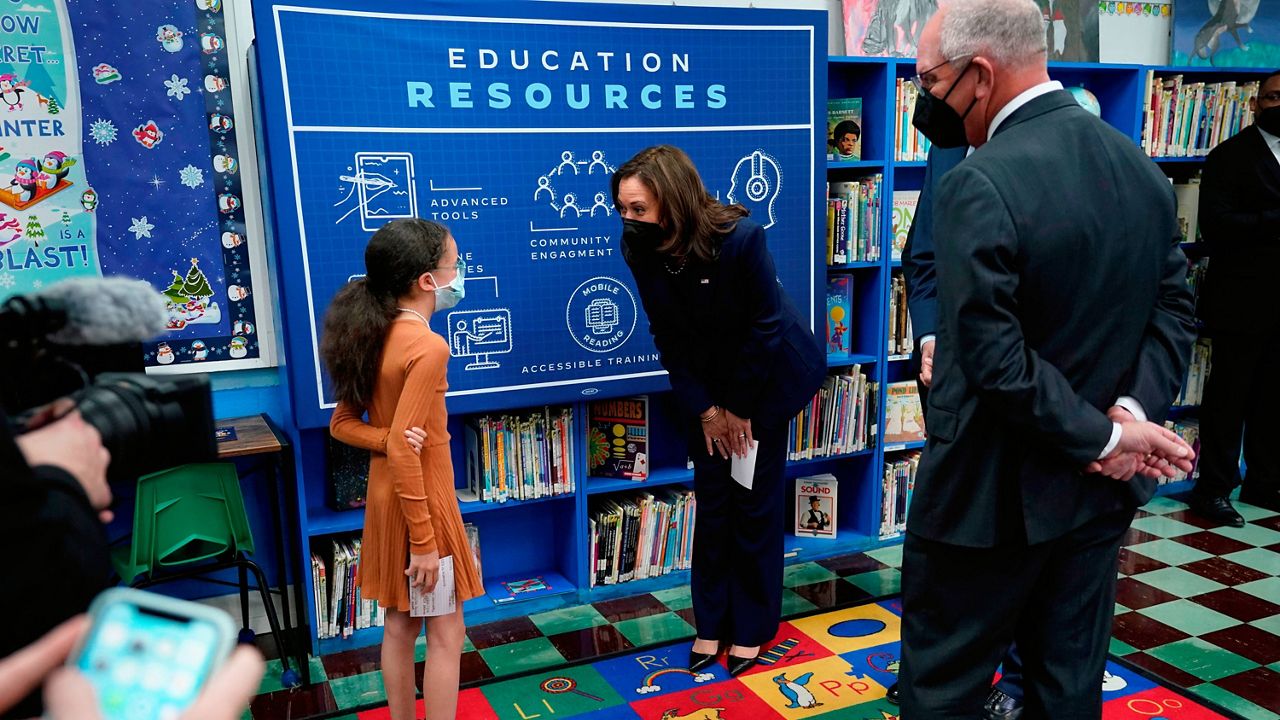Vice President Kamala Harris traveled to Louisiana on Monday to remind Americans that, in 2022, infrastructure involves more than roads, bridges and pipelines.
It also means broadband internet.
What You Need To Know
- Vice President Kamala Harris traveled to Sunet, Louisiana, on Monday to remind Americans that, in 2022, infrastructure involves more than roads, bridges and pipelines; it also means broadband internet
- Sixty-five billion dollars of the $1 trillion Bipartisan Infrastructure Law passed by Congress in November is dedicated to the goal of bringing affordable, accessible high-speed internet to all Americans
- The Commerce Department announced last month that it awarded 13 broadband grants totaling more than $277 million, the first batch of the new infrastructure funding
- BroadbandNow Research estimated last year that 42 million Americans didn’t have the ability to purchase broadband internet, and the White House says 35% of rural Americans and tribal communities lack wired access to broadband
Sixty-five billion dollars of the $1 trillion Bipartisan Infrastructure Law passed by Congress in November is dedicated to the goal of bringing affordable, accessible high-speed internet to all Americans.
The Commerce Department announced last month that it awarded 13 broadband grants totaling more than $277 million, the first batch of the new infrastructure funding. The grants are being used to connect more than 133,000 households in 12 states and the U.S. territory of Guam to high-speed internet.
“President (Joe) Biden and I, well, we've been working day in and day out to build an economy that works for working people, an economy in which every person has what they need to get ahead and to thrive,” Harris said in a speech after touring a library in the small town of Sunset. “High-speed broadband internet is critical to that effort. In the 21st century, high-speed internet is a necessity. Full stop.”
Louisiana’s Acadiana region, which includes 22 parishes in the southern part of the state, is receiving $29 million to bring broadband to more than 22,000 households and 3,000 small businesses.
In St. Landry Parish, where Sunset is located, 30% of households do not have high-speed internet, resulting in some students doing homework over WiFi from fast-food parking lots or seniors participating in virtual doctor’s appointments in public libraries within earshot of strangers, Harris said.
She added that Americans have become more reliant on the internet since the pandemic began two years ago.
“So much of our world, if we think about it, has moved online,” she said. “Throughout the pandemic, people depended on high-speed internet like never before.”
Harris was introduced by a student named Josie, who described the challenges of virtual learning during the early weeks of the pandemic. She said she and her classmates were repeatedly kicked out of Google Meet or struggled to log in.
“This caused the process of virtual learning to be 10 times more difficult,” Josie said. “Due to repeated connectivity problems, virtual learning failed after just one month.”
The Biden administration has made a priority of making high-speed internet more accessible, saying it can help students learn both at home and in the classroom, small businesses remain competitive, residents receive telehealth services. New jobs laying fiber optic cables also are being created.
BroadbandNow Research estimated last year that 42 million Americans didn’t have the ability to purchase broadband internet. According to the White House, 35% of rural Americans and tribal communities lack wired access to broadband.
“Far too many of our fellow Americans simply cannot afford the cost of a high-speed internet plan,” Harris said. “And too many others do not even have access to such a plan.”
Harris was accompanied in Louisiana by Gov. John Bel Edwards, Deputy Commerce Secretary Don Graves and Rep. Troy Carter, D-La.
Other states awarded broadband grants in February were Georgia, Kentucky, Maine, Mississippi, Missouri, Nevada, North Carolina, Pennsylvania, Texas, Washington and West Virginia.



